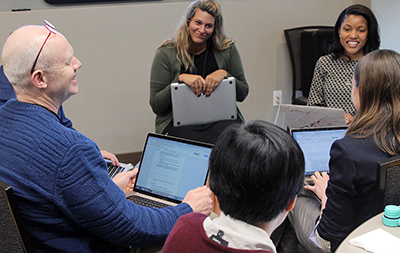Community of Practice

AccessINCLUDES's Broadening Participation Community of Practice
Attendees of AccessINCLUDES events and others interested in the inclusion of people with disabilities in STEM and computing have joined a Community of Practice (CoP) to discuss ways of increasing the engagement of those with disabilities in the INCLUDES community. The “community of practice” paradigm has origins in business; in a CoP, practitioners with common interests (e.g., broadening participation in STEM) help each other improve practices (e.g., developing resources that are accessible to individuals with disabilities). Participants in the Broadening Participation CoP may
- recommend content and format and flesh out ideas for the conference;
- identify useful existing publications and other products that support project objectives and can be linked from the AccessINCLUDES website;
- propose content for the AccessINCLUDES Knowledge Base; and
- discuss potential evaluation, research, and dissemination practices that can advance the AccessINCLUDES goal and objectives.
You and your colleagues can join this CoP by sending the following information to doit@uw.edu:
Name
Position/ Job Title
Institution
Postal Address
Email
Address
Disability and Accessibility in STEM Group
AccessINCLUDES also leads the Disability and Accessibility in STEM Group on the Eddie Bernice Johnson INCLUDES National Network website. To join, sign up and register to become a member of the National Network website. Once you are registered, you can find the Disability and Accessibility in STEM Group on the Groups page.
This affinity group brings together a community interested in the inclusion of people with disabilities in STEM fields. Discussion will address ways to make activities and resources accessible, usable, and inclusive; collect and report data on disability; include people with disabilities and their perspective throughout a research study or other funded project; develop collaborations with stakeholders; and otherwise address disability-related issues as a diversity effort.